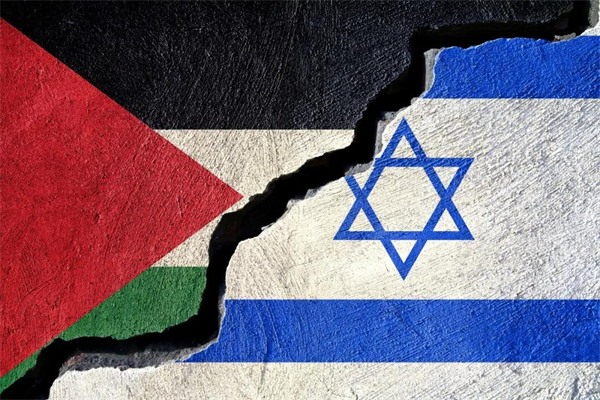
On October 7, local time, the Palestinian Islamic Resistance Organization (Hamas) launched a surprise attack on Israel, Israel immediately declared a "state of war" and launched a fierce response, a new round of Israeli-Palestinian conflict erupted. According to media reports, more than 2,800 people have been killed and more than 10,000 injured in the conflict so far. The rapid escalation of the Palestinian-Israeli conflict has drawn wide attention from the international community. UN Secretary-General Antonio Guterres immediately issued a statement, urging all parties to make diplomatic efforts to avoid the expansion of the Palestinian-Israeli conflict. On October 8, the spokesperson of the Chinese Foreign Ministry said at a press conference that the repeated conflicts between Palestine and Israel fully show that the long-term stagnation of the peace process is not sustainable, and the fundamental way out of the Palestinian-Israeli conflict is to implement the "two-state solution" and establish an independent Palestinian state.
The centuries-old conflict between Israel and Palestine is complex and difficult to understand. The root cause is that Israelis and Palestinians cannot coexist peacefully in the Palestinian territories. In 1947, the United Nations General Assembly adopted Resolution 181, which decided to establish a "Jewish state" and an "Arab state" in the Palestinian area, in order to implement the "partition" of the Palestinian area. Shortly after the adoption of Resolution 181, Israel declared its statehood. But the first Middle East war broke out - and plans for Palestinian statehood were repeatedly postponed - because the Arab states saw the resolution as unfair to the Arabs. After five Middle East wars, the land originally divided into Palestinians has been continuously eaten and divided by Israel and neighboring countries, so the goal of Palestinian statehood is even more distant. Since then, as the balance of power between Israel and the Palestinians has grown, the Palestinian National Liberation Organization (Fatah), the legitimate representative of the Palestinians, has gradually abandoned the strategy of armed struggle and instead sought statehood through peace talks with Israel.

In the 1990s, Yasser Arafat's Fatah party and Yitzhak Rabin's Israeli government signed the Oslo Accords, launching the "land for peace" Middle East peace process. Under the deal, Israeli forces withdrew from Gaza and Jericho, the Palestinians granted limited self-rule in the territory, and Israel and the Palestinians recognized each other's right to exist. The century-old dispute between Palestine and Israel has thus ushered in the dawn of "peace" for the first time. However, with Rabin's assassination, extremist forces on both sides gained the upper hand, and the implementation of the Oslo Accords was suspended indefinitely. In particular, after the rise of Hamas, which advocates armed struggle, and Fatah, it not only destroyed the internal unity of Palestinians, but also made the bitter taste between Palestine and Israel more pungent.
Today, the Middle East peace process has been stalled for more than 20 years, and the Israeli-Palestinian conflict has never subsided during this period. In 2002, the 14th Arab League Summit put forward an "Arab Peace Initiative" aimed at ending the Arab-Israeli dispute, calling for Israel to withdraw from all Arab territories occupied in the 1967 Third Middle East War and accept the establishment of a sovereign and independent Palestinian State with East Jerusalem as its capital. On this basis, the Arab states will sign peace agreements with Israel and gradually establish normal relations with Israel. The Arab Peace Initiative, which contains the main content of the so-called two-state solution, is an important proposal put forward by Arab countries in order to quell the Palestinian-Israeli conflict as soon as possible, ease the regional security situation and achieve lasting peace in the Middle East. It has been widely supported by major countries in the world, including China.
Although the "two-state solution" has been widely recognized by the international community, it is still difficult to implement. Among them, Israel's hardline attitude is one of the important reasons for obstructing Palestinian statehood. The current Netanyahu government is hawkish on the Palestinian issue and has steadfastly rejected the return of Palestinian refugees to their lands. In addition, the Palestinian economy is controlled by Israel, and even its own customs duties need to be collected and transferred by Israel, which undoubtedly greatly reduces its autonomy. The split between Fatah and Hamas also means that the future unification of a "Palestinian state" will not be smooth.

Nevertheless, the "two-state solution" still plays an "original" role in solving the Palestinian-Israeli issue. Although there is a long road ahead, the realization of lasting peace in the Middle East is the common aspiration of all countries in the world. Therefore, the international community still needs to make sustained efforts for a ceasefire between Palestine and Israel and the implementation of the two-State solution. In particular, against the backdrop of the escalating situation, both Palestine and Israel should exercise restraint and resume peace talks to avoid a more serious humanitarian crisis.
The large-scale outbreak of the Palestinian-Israeli conflict once again reminds the world that the Middle East peace process will retreat if it does not advance, and the Palestinian issue cannot be put off any longer. Piecemeal crisis management cannot fundamentally solve the problem. The international community should promote the effective implementation of the two-state solution as soon as possible with the greatest sense of urgency so as to avoid the Palestinian-Israeli issue falling into a vicious circle.

The 2025 US holiday shopping season was supposed to be a double celebration for both merchants and consumers. However, the reality is shrouded in a "bill chill."
The 2025 US holiday shopping season was supposed to be a do…
On November 5th, the US federal government entered its 36th…
JPMorgan Chase CEO Jamie Dimon recently made important asse…
When the US Senate passed a resolution with 51 votes in fav…
Recently, according to Teslarati, Tesla announced that the …
Nikkei Group, the Japanese business information giant that …